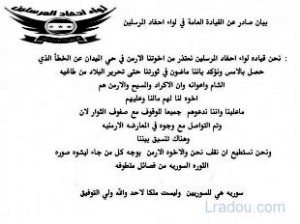Special for The Armenian Weekly
For the past three years, Syrians have been terrorized by the ongoing
conflict between the government and the various factions of the
opposition. The destruction is staggering: 150,000 dead, 9 million
displaced (refugees and IDPs), 3 million homes damaged, and half of the
country’s infrastructure destroyed.
On March 8, the Martyrs of the Badr Brigade launched an offensive in
the Meedan neighborhood of Aleppo. Later that evening, the brigade
posted a Youtube video demonstrating the details of the operation.
“In response to the barrel attacks by the regime forces, we, the
Martyrs of the Badr Brigade, will target the Syrian government bases in
the Meedan and Suleymaniyeh neighborhoods,” said the leader of the
brigade. “For their own protection, we urge civilians living near the
Shabiha military bases to move out of those areas.”
The vast majority of the inhabitants of the Meedan and Suleymaniyeh
neighborhoods are Armenians. Not surprisingly, the March 8 attacks
damaged homes of Syrian-Armenians in Aleppo. “Go to hell you stupid
people,” reacted one Syrian-Armenian civilian on social media. She later
told me that her home had been destroyed in these attacks.
A few days later, the leadership of the Lewaa Ahfad al-Moursaleen,
another rebel group fighting against the Assad regime, sent a letter of
apology to the Syrian-Armenian leadership in Aleppo.
The letter stated:
“We, the leadership of the Ahfad al-Moursaleen Brigade, apologize to
our Armenian brothers for the mistake that took place yesterday in the
Meedan neighborhood.
“We affirm that we are moving forward with our revolution against the
tyrant and his supporters. The Kurds and the Armenians are our
brothers. Their suffering is our suffering. We urge all of you to stand
with the revolution.”
The ferocity of the Syrian conflict has left no room for objectivity.
Every aspect of this conflict is analyzed and presented based on the
vantage point of the beholder. For the Syrian government and its
supporters, the Martyrs of the Badr Brigade or the Ahfad al-Moursaleen
Brigade qualify as terrorist groups, whereas the opponents of the Syrian
government hail them as freedom fighters.
But while subjectivity is the order of the day in Syria, the fact
remains that the March 8 attacks failed to cause any damage to the
Syrian regime bases. The attacks resulted in the damaging of homes and
buildings belonging to Syrian-Armenian civilians. Whether intentionally
or unintentionally, the attacks terrorized the Armenian community in
Syria and, more importantly, the attacks constitute a clear violation of
international humanitarian law.
But while violations of international humanitarian law and all norms
of international law is a common feature of life in Syria these days,
the ironic aspect of the March 8 attacks is that the buildings that were
damaged were located across the street from the Karen Jeppe Armenian
College. Karen Jeppe was the Danish missionary who took care of the
survivors of the Armenian Genocide.
Whereas it took two days for “terrorists” in Syria to acknowledge
their crimes and present an official apology to the Syrian-Armenian
community, the Turkish government continues to pursue a policy of denial
almost 100 years after the Armenian Genocide. If “terrorists”
acknowledge their own crimes, then what does that say about the Turkish
government?
Sunday, March 23, 2014
Subscribe to:
Post Comments (Atom)


No comments:
Post a Comment